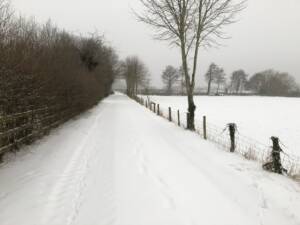We are often asked what happens to bees in the winter? Do they hibernate?
Well, the short answer to the question is no. Honey bees do not hibernate but they do completely change their habits during the colder months and you will rarely see honey bees flying during this period.
Because bees are cold blooded the environmental temperature is very important to her as she has no real internal body temperature control system. A cold bee is a dead bee!! By the way I say her because it is only the female bees that go through the winter. The boys who just represent extra mouths to feed have been killed off at the end of summer.
Toward the end of the active season as the daytime temperatures start to fall the bees will begin their winter preparations. They will form a ball between the combs in the brood box, a technique known as clustering. The idea of this clustering is one of mutual bodily warmth thus reducing heat loss. It is for this reason that once the bees have formed the ball it is vital that the beekeeper does not open the hive letting precious heat out. The centre of the ball of bees needs to be between 20 and 30 degrees C no matter what the outside temperature. The queen should have stopped laying and will be kept warm in the middle of this ball of bees. The heat they can generate is incredible. In his excellent book Guide To Bees & Honey Ted Hooper talks about records where a cluster temperature of 31 C has been measured with an outside temperature of minus 28 C.
In order to generate this heat the bees need a lot of honey. When I started beekeeping over twenty years ago it was recommended to leave around 35lbs of honey on the hive to see the bees through the winter. Climate change has lead to the bees clustering much later and breaking the cluster much earlier in the spring as well as breaking the cluster on warm days during the winter. I now leave at least 50lbs of feed on each hive and even that may need topping up in the spring.
Even in ideal conditions bees will have to leave the cluster at certain times during the winter. Bees are very clean insects and so will never foul their own hive and so periodically they will need to leave to do “cleansing flights”. They will also need to leave the hive to collect water. Whilst honey is the food of bees during the winter period they are unable to eat it in it’s concentrated form. The honey needs to be diluted to 50% water content before the bees can eat it and so water must be collected.
Beekeepers really want long cold winters as this means that bees are using less stores as they cluster early and stay clustered longer and most importantly the big enemy of the bee (varroa) cannot reproduce when there is no honey bee brood. A cold winter will really knock back the varroa numbers.
So you can see that honey bees do not hibernate and indeed the colony still has a lot going on even though we can’t see any of this from the outside.
Interestingly the life expectancy of a worker bee increases dramatically during the winter from only six weeks during the summer to as much as six months during the winter. Much of this extra life is thought to be around the fact that no real work is going on during the winter in that there is no brood to raise and no gathering or honey processing going on. No kids and no real work!
Proof positive that hard work kills you!!!!

